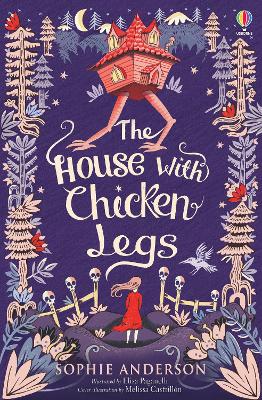
nannah
Representation:
There are some non-white secondary characters who come and go, like Nina, who’s hinted to live somewhere in Africa (either Africa or SW Asia), and other girls who also live in Africa, probably in Morocco.
Twelve-year-old Marinka lives with her baba in a house with chicken legs, traveling all around the world. Sounds like she’s living a dream, except that she can never leave the house and can never make a friend for longer than a single night. She’s training for an important job: she’s a Yaga, which means she’s destined to guide the dead into The Gate every night. But Marinka hates her destiny and wishes she could leave her house and join the living, make an actual friend, and leave the Guardian duties to her baba. When she tries to change her life, however, and keeps one dead girl from passing on, she realizes how dangerous messing with destiny can be.
On its own, this book is a really lovely middle grade novel, focusing on Marinka’s loneliness, her desperation for a connection with living people, etc. Maybe I’m just super petty, though, because I just couldn’t get over how Jędzibaba is cheapened down to a shiny little concept to give this YA more sparkle. Marinka could simply be in a house that moves, right? To me, Jędzibaba is someone who could have once been a goddess, and some of my acquaintances still give her offerings and prayers. She’s a dark, dangerous wild forest goddess/spirit who aids some and punishes others. She does exist in a liminal space, but making her a thing that, like … is simply a bloodline occupation is so saddening; anyone can be a Yaga if your parents were, etc. But I think what most bothers me is that these (white) Yaga dominate every other culture and belief: every other culture’s dead passes through the Yagas’ Gates. No matter the religion, somehow they all go through the Slavic Gates. Why? If Sophie Anderson didn’t mean for it to be this way, why do the Yaga only practice Slavic (Russian) culture, make Russian feasts, put the spirits through their own culture when they were passing, etc? Look, I know this is a middle grade novel, but it bothered me!
Marinka also only worries about herself. It seems like she worries about others, sure -- but that's only because if they got better/came back, then her own life would improve or get back to normal. Yes, this is a very childlike want, but I expected her to mature a little over the course of the novel. And while she did grow some, it's enough for it to be obvious to the age group, I think. Maybe I’m wrong! But I’m not sure. The end was very heartwarming, though, and I’m glad she was able to compromise. I think the ending was perfect for the characters, the book overall, and for me (lol). It made me smile and feel warm and content. It’s a perfect ending in pretty much every way. I just think the come-down period and the MC’s growth happened a little too fast.
The writing is also a bit sloppy. Commas are everywhere they shouldn't be, especially in places where there's meant to be a pause instead. Where's the editor in all this? This is their job! There's also some very, VERY large plot holes, where the house shows a huge amount of magic that could have fixed things in the beginning and it conveniently ... didn't.
But really, this is a lovely middle grade novel. I'm just nitpicking, as always!
